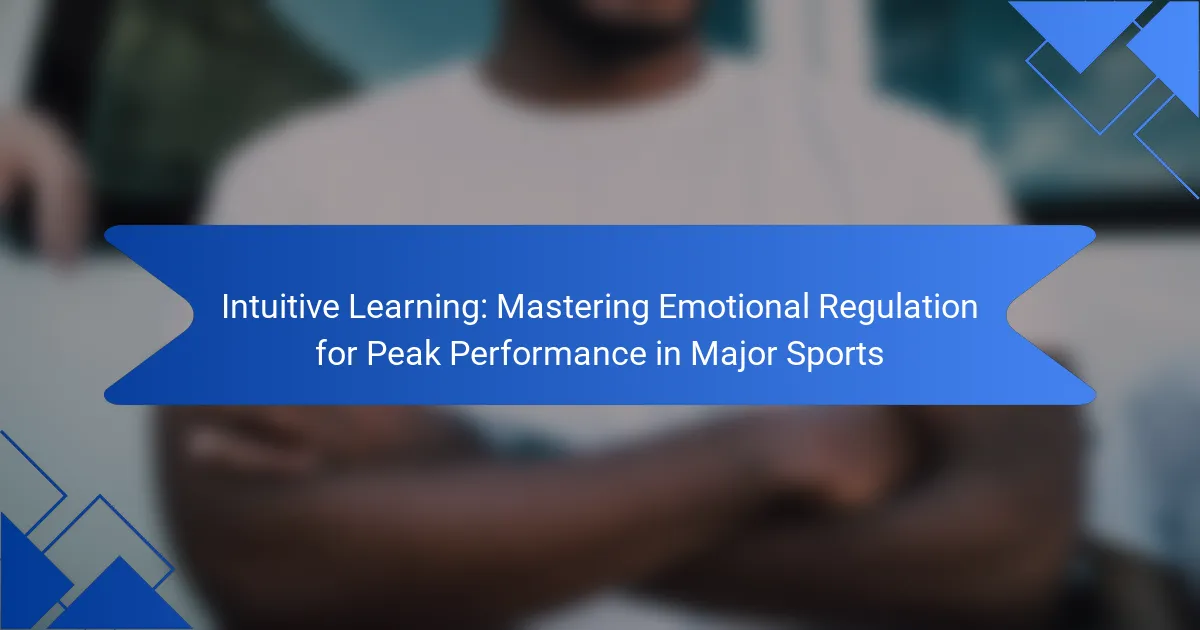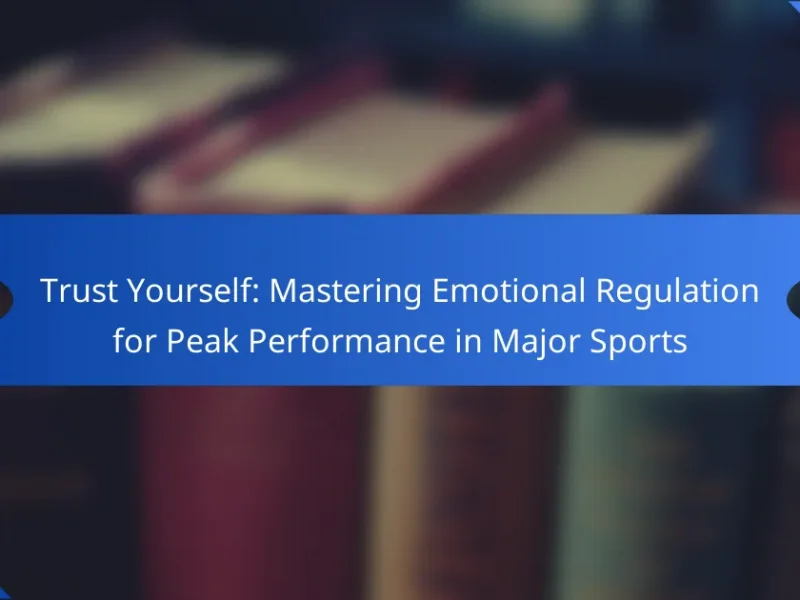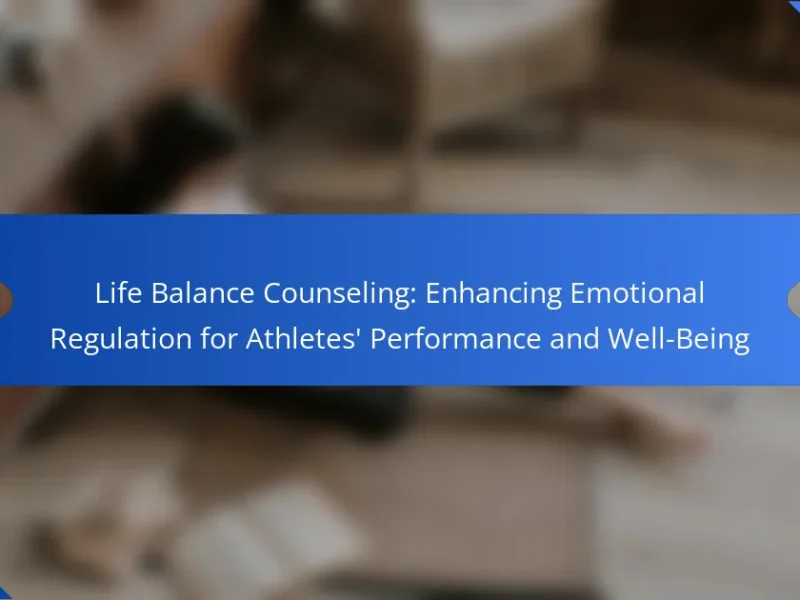Mastering emotional regulation is crucial for athletes aiming for peak performance in major sports. This article explores techniques like mindfulness and cognitive restructuring, essential attributes such as awareness and resilience, and the unique qualities that enhance adaptability and emotional intelligence. By developing these skills, athletes can improve focus, decision-making, and teamwork, ultimately leading to greater success in competitive environments.

What is Emotional Regulation in Major Sports?
Emotional regulation in major sports involves managing feelings to enhance performance. Athletes use techniques like mindfulness and cognitive restructuring to maintain focus and composure under pressure. These strategies lead to improved decision-making and resilience, crucial for peak performance. Effective emotional regulation is linked to increased motivation and better teamwork, essential attributes for success in competitive environments.
Why is Emotional Regulation Critical for Peak Performance?
Emotional regulation is critical for peak performance as it enhances focus and resilience. Athletes who master emotional regulation can manage stress, maintain motivation, and improve decision-making under pressure. This mastery leads to consistent performance, especially in high-stakes situations. Research indicates that emotional regulation strategies, such as mindfulness and cognitive restructuring, contribute significantly to an athlete’s ability to perform optimally. By effectively regulating emotions, athletes can harness their full potential and achieve superior results in major sports.
How Does Emotional Regulation Impact Athlete Well-Being?
Emotional regulation significantly enhances athlete well-being by fostering resilience and focus. It enables athletes to manage stress, anxiety, and performance pressure effectively. Research indicates that athletes with strong emotional regulation skills experience improved mental health outcomes, such as reduced burnout and increased satisfaction in their sport. Additionally, mastering emotional regulation can lead to better decision-making during competitions, ultimately contributing to peak performance.

What are the Universal Attributes of Emotional Regulation Systems?
The universal attributes of emotional regulation systems include awareness, control, adaptability, and resilience. These attributes enhance athletes’ performance by fostering emotional intelligence and effective coping strategies. Awareness allows athletes to recognize their emotional states, while control enables them to manage responses. Adaptability helps in adjusting to changing circumstances, and resilience supports recovery from setbacks. Together, these attributes create a robust framework for mastering emotional regulation in sports.
How Do Athletes Typically Develop Emotional Regulation Skills?
Athletes typically develop emotional regulation skills through intentional practice and self-awareness. Techniques include mindfulness, visualization, and cognitive restructuring. These methods enhance focus and resilience, enabling athletes to manage stress and maintain peak performance during competitions. Regular feedback from coaches and peers further refines these skills, fostering a supportive environment for emotional growth.
What are Common Techniques for Emotional Regulation?
Common techniques for emotional regulation include mindfulness, cognitive restructuring, and deep breathing exercises. These methods enhance athletes’ focus and performance by managing emotions effectively.
Mindfulness practices help individuals stay present, reducing anxiety and improving concentration. Cognitive restructuring involves identifying and challenging negative thoughts, fostering a positive mindset. Deep breathing exercises promote relaxation and physiological calmness, aiding in stress management.
Incorporating these techniques into training routines can lead to improved emotional resilience and peak performance in major sports.
How Does Emotional Regulation Enhance Focus and Concentration?
Emotional regulation enhances focus and concentration by allowing athletes to manage stress and anxiety effectively. This mastery leads to improved decision-making and performance under pressure. Research indicates that athletes with strong emotional regulation skills can maintain a clear mindset, which directly contributes to peak performance. For instance, studies show that emotional intelligence correlates with better focus, enabling athletes to stay present during competition.

What Unique Attributes Distinguish Emotional Regulation Systems in Sports?
Unique attributes that distinguish emotional regulation systems in sports include adaptability, self-awareness, and resilience. Adaptability allows athletes to modify their emotional responses to varying competitive situations. Self-awareness helps in recognizing emotional triggers and managing them effectively. Resilience enables athletes to recover from setbacks and maintain focus under pressure. These attributes collectively enhance performance and contribute to mastering emotional regulation for peak performance in major sports.
How Do Different Sports Require Tailored Emotional Regulation Approaches?
Different sports necessitate distinct emotional regulation strategies to optimize performance. For instance, team sports like basketball require quick, adaptive emotional responses to dynamic situations, while individual sports such as golf demand sustained focus and emotional control over extended periods.
Athletes in high-contact sports, like football, often benefit from aggressive emotional regulation techniques to channel intensity positively. Conversely, endurance athletes may focus on calming techniques to manage stress levels during prolonged competition.
Understanding these tailored approaches enhances athletes’ ability to navigate their unique emotional landscapes, ultimately leading to improved performance outcomes. Each sport’s specific demands shape the emotional regulation strategies athletes adopt, reflecting the unique attributes of their disciplines.
What Role Do Coaches Play in Emotional Regulation Systems?
Coaches play a crucial role in emotional regulation systems by providing guidance and support. They help athletes recognize and manage their emotions, enhancing performance under pressure. Coaches implement strategies such as mindfulness and emotional awareness to foster resilience. This unique attribute of coaching can lead to improved focus and better decision-making during competitions.
How Can Technology Support Emotional Regulation in Athletes?
Technology enhances emotional regulation in athletes through apps, wearables, and virtual reality. These tools provide real-time feedback, allowing athletes to monitor stress levels and emotional states. For instance, biofeedback devices can measure heart rate variability, helping athletes identify when they need to employ regulation techniques. Moreover, virtual reality can simulate high-pressure scenarios, enabling athletes to practice emotional responses in a controlled environment. This integration supports peak performance by fostering resilience and focus during competitions.

What are the Rare Attributes of Emotional Regulation Systems?
Emotional regulation systems exhibit rare attributes such as adaptability, resilience, and nuanced emotional awareness. These attributes enhance athletes’ ability to respond to stress and maintain peak performance. Adaptability allows for quick shifts in emotional responses during competition. Resilience fosters recovery from setbacks, while nuanced emotional awareness enables precise emotional management. These qualities collectively contribute to superior performance in high-stakes sports environments.
What Innovative Practices are Emerging in Emotional Regulation?
Innovative practices in emotional regulation focus on intuitive learning techniques that enhance athletes’ performance. Techniques such as mindfulness training, biofeedback, and cognitive restructuring are emerging. These practices help athletes recognize and manage emotions effectively, improving focus and resilience during competition. Additionally, integrating technology like wearable devices allows real-time emotional monitoring, providing athletes with immediate feedback to adjust their mental state. These advancements contribute to mastering emotional regulation, ultimately leading to peak performance in major sports.
How Do Cultural Factors Influence Emotional Regulation in Sports?
Cultural factors significantly shape emotional regulation in sports by influencing athletes’ responses to stress and competition. Different cultural backgrounds affect coping strategies, communication styles, and emotional expression. For instance, collectivist cultures may promote team cohesion, while individualistic cultures emphasize personal achievement. These variations can lead to diverse emotional regulation techniques, impacting performance. Athletes from cultures that value emotional restraint may excel in high-pressure situations, whereas those from expressive cultures might harness their emotions to boost motivation and energy. Understanding these dynamics is essential for coaches and sports psychologists to tailor support strategies effectively.

What are the Best Practices for Mastering Emotional Regulation?
To master emotional regulation in major sports, athletes should practice self-awareness, mindfulness, and cognitive restructuring. These techniques enhance focus, resilience, and overall performance. Regularly engaging in mental training exercises can lead to improved emotional control during high-pressure situations. Additionally, developing a support system and seeking feedback can further reinforce emotional regulation skills.
What Common Mistakes Should Athletes Avoid in Emotional Regulation?
Athletes should avoid common mistakes in emotional regulation to enhance performance. Key pitfalls include ignoring emotions, overreacting to stress, neglecting self-reflection, and failing to seek support. Recognizing and addressing these issues fosters resilience and optimal focus during competition.
How Can Athletes Continuously Improve Their Emotional Regulation Skills?
Athletes can improve their emotional regulation skills through consistent practice and self-awareness. Techniques such as mindfulness, visualization, and cognitive restructuring enhance emotional control. Research indicates that athletes who engage in regular emotional training experience increased focus and reduced anxiety during competition. Additionally, seeking feedback from coaches and utilizing mental performance specialists can provide tailored strategies for ongoing improvement.
What Expert Insights Can Guide Athletes in Emotional Regulation?
Expert insights emphasize that athletes can enhance emotional regulation through mindfulness techniques, cognitive restructuring, and visualization strategies. Mindfulness practices help athletes remain present, reducing anxiety. Cognitive restructuring allows athletes to challenge negative thoughts, fostering resilience. Visualization techniques enable athletes to mentally rehearse successful performance, reinforcing confidence. These approaches collectively contribute to improved emotional stability and peak performance in major sports.


